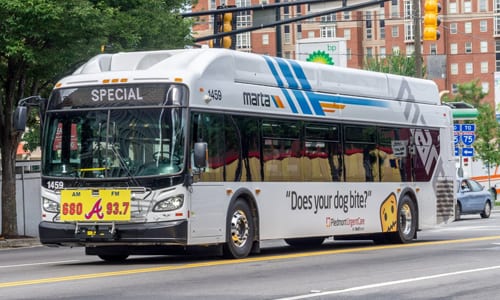
MARTA has received a $2.6 million grant by the U.S. Department of Transportation for the purchase of six zero-emission battery electric buses to replace six diesel models. Removing the 2005 diesel versions from the fleet will reduce MARTA’s emissions by 935 short tons of greenhouse gases and reduce energy consumption by 14.3 terajoules.
The energy saved by the deployment of the zero-emissions buses is equivalent to nearly 250 years of gas for the average American car driver. Zero-emissions vehicles also prevent the release of fine particulate matter – atmospheric pollutants suspended in the air in the form of minute solid particles or liquid droplets that can be hazardous to health and the environment.
“Receiving the Low-No grant will help MARTA put technologically advanced buses with low-to-no emission in densely populated areas with high ridership routes,” said MARTA General Manager and CEO Jeffrey Parker. “This welcomed first step toward making our bus fleet environmentally friendly will have community-wide impact. We are grateful to the Center for Transportation and the Environment (CTE) for their partnership and support in the application process and as we plan for installation and ongoing support of the fleet.”
CTE is a nonprofit organization focused on the advancement of clean, sustainable, innovative transportation and energy technologies. Since its inception in 1993, the organization has helped more than 200 companies improve their transportation technologies and fuels to reduce environmental impact.
“We are excited to partner with MARTA on its first zero-emission bus deployment,” said Jason Hanlin, CTE’s director of Technology Development. “CTE has helped more than 60 transit agencies across the country deploy zero-emission buses, and we are especially proud to be working with our hometown agency in its critical efforts to advance sustainable transportation for the Atlanta region.”
The heavy duty transit Xcelsior buses, manufactured in an Anniston, Alabama, facility, are 40 feet in length and have a passenger capacity of 38 standing and 38 seated. Supported by opportunity fast conductive charging at the East Lake station, heavy duty plug-in depot chargers at the Laredo Operating Facility and a heavy duty deport charger at the Browns Mills Bus Maintenance Facility to support the buses during heavy maintenance and repair events, on-route charging allows the buses to operate throughout the day without returning to the bus depot.
The new buses, expected to be deployed by July 2021, will run on Routes 2 (Ponce de Leon/East Lake) and 102 (Ponce de Leon/Little Five Points). The routes share a common western terminus at North Avenue Station. On the eastern end, Route 2 is anchored at East Lake Station while Route 102 terminates at Candler Park/Edgewood Station. Destinations along the routes include Ponce City Market, the Fernbank Museum and a variety of retail and grocery destinations.


![Validate my RSS feed [Valid RSS]](https://web.archive.org/web/20240108205913im_/https://ocgnews.com/wp-content/uploads/2022/07/valid-rss-rogers.png)

